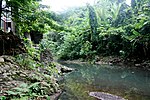Raid on Los Baños

The Raid on Los Baños (Filipino: Pagsalakay sa Los Baños) in the Philippines, early Friday morning on 23 February 1945, was executed by a combined United States Army Airborne and Filipino guerrilla task force, resulting in the liberation of 2,147 Allied civilian and military internees from an agricultural school campus turned Japanese internment camp. The 250 Japanese in the garrison were killed. It has been celebrated as one of the most successful rescue operations in modern military history. It was the second precisely-executed raid by combined U.S.-Filipino forces within a month, following on the heels of the Raid at Cabanatuan at Luzon on 30 January, in which 522 Allied military POWs had been rescued.: 4 The air/sea/land raid was the subject of a 2015 nonfiction book, Rescue at Los Baños: The Most Daring Prison Camp Raid of World War II, by New York Times bestselling author Bruce Henderson.
Excerpt from the Wikipedia article Raid on Los Baños (License: CC BY-SA 3.0, Authors, Images).Raid on Los Baños
Calle la Marina, Santa Cruz de Tenerife El Toscal (Centro-Ifara)
Geographical coordinates (GPS) Address Nearby Places Show on map
Geographical coordinates (GPS)
| Latitude | Longitude |
|---|---|
| N 14.16161 ° | E 121.24239 ° |
Address
Fuente de los Delfines
Calle la Marina
38002 Santa Cruz de Tenerife, El Toscal (Centro-Ifara)
España
Open on Google Maps


